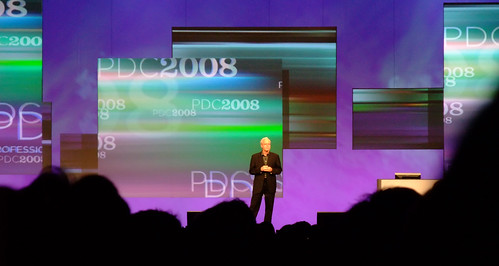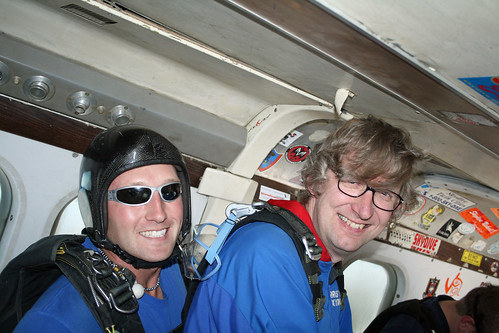Sorry for the title. I find cloud computing quite easy to poke fun at. In fact:
"Are clouds the ultimate form of vapourware? And if is called Windows Azure, surely that's the colour of the sky, not the clouds? Shouldn't it be called something like 'Windows White and Fluffy'".
See. Easy. Although after the sessions today I think it is probably a bit unfair.
I was up very early, almost in time to catch the third bus to the conference centre.

This scene was outside the hotel at 7:00 am this morning. I think it sums up the American Dream quite nicely.
But enough of this, the keynote started at 8:30 and so after a very nice breakfast it was down to the really big hall.

This is just part of the Hall.
Ray Ozzie took over from Bill Gates earlier this year, and this was the first time that he had flown solo so to speak. He was very good, describing his vision of computing that is just "out there" very well. I'm less convinced by the sample application that they chose to first articulate this vision though, the BlueHoo social networking app that lets you find out if anyone around you is someone you know - I kind of high tech, Bluetooth powered, cloud network, version of looking and shouting.
But that aside, the underlying thinking seems very solid, and when I heard that one of the people behind the cloud architecture was Dave Cutler, the man who made Windows NT all those years ago, I was much more interested. Windows NT is the basis of the technology that sits underneath all the Windows desktop and server platforms.

Ray on the stage
Whether or not cloud computing is the next big thing is debatable, but you can't deny that it is big. What Microsoft want to do is provide a means by which you can take code that you have written using conventional languages and tools and put it up on their servers so that anyone can use it, from anywhere in the world. And if millions decide to use your program, they can - because the underlying system will handle the distribution of the software around the world and the balancing of the load on the various servers.
Of course horsepower on its own is no good to you, there is also a need for data stores of various kinds. from blobs of data to SQL databases. And all this must work in an environment where systems crash, networks fail, and bad people are out there trying to break things all the time. Tricky stuff.
If Microsoft can pull this one off they will really have moved computing onto the next stage in its development. The architecture and the way you manage your programs seems very well thought out, although they admit that the system will be a "work in progress" for a while yet.
As far as I'm concerned it is all very exciting. People write software so that others can use it. The cloud means that if I have an idea for a million user, killer application - say I want to write the next MySpace - then I don't have to worry about getting server farms, buying network bandwidth and hosting all the user's data. I can get just put my application out there on the cloud behind a network address for people to use.
Of course money will have to change hands. Microsoft will want me to pay them to host my software, but this payment will be based on the use of my program. I only have to pay for the services that I consume. I'll pay more if I have more users, but since the more users I have the more income I should have then it all comes out OK in the end. This is a new business model that anyone who writes programs that provide services to others will have to take note of.
The thing that really does it for me though is the way that I can now take C Sharp and Visual Studio and write code for thumbnail sized computers to control my Christmas tree lights or go all the way to the other end of the spectrum and turn out an application for millions of people to use. All with the same essential skills.
I went to a few more talks on Windows Azure as it is now called, and I must admit it looks good.
And I'm feeling a bit guilty about poking fun at it.













































